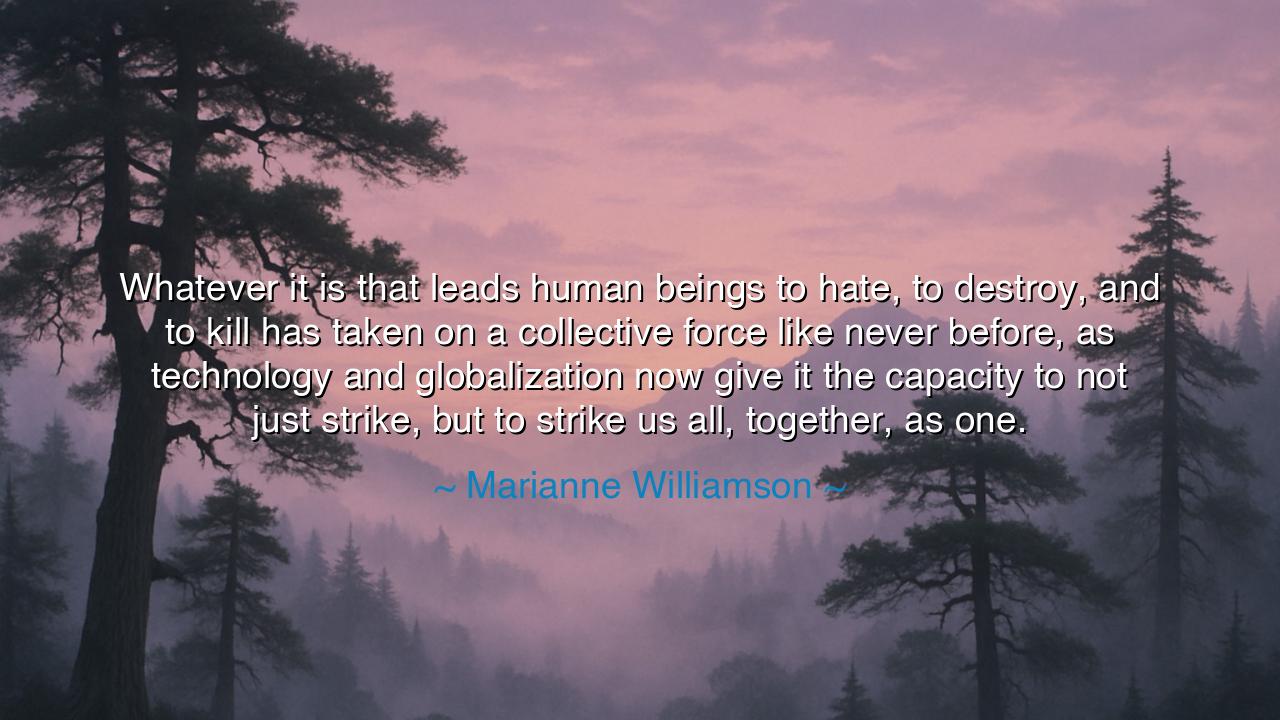
Whatever it is that leads human beings to hate, to destroy, and
Whatever it is that leads human beings to hate, to destroy, and to kill has taken on a collective force like never before, as technology and globalization now give it the capacity to not just strike, but to strike us all, together, as one.






Hear the solemn warning of Marianne Williamson, who declared: “Whatever it is that leads human beings to hate, to destroy, and to kill has taken on a collective force like never before, as technology and globalization now give it the capacity to not just strike, but to strike us all, together, as one.” These words are heavy, like the tolling of a great bell. They remind us that the oldest shadows of humanity—hatred, cruelty, and violence—have not disappeared, but have instead found new strength in the vast web of modern technology. What was once local now becomes universal; what was once the rage of one tribe against another now has the capacity to wound the whole of humanity in a single stroke.
The ancients knew well the destructive power of hate. Cain rose against his brother Abel, and from that first spilling of blood came the lesson that the impulse to destroy lies deep in the heart of man. Kingdoms rose and fell, not only through ambition, but through fear and vengeance. Yet in those days, the reach of violence was limited by distance, by the slowness of travel, by the separation of peoples. Today, Williamson reminds us, those limits are gone. Globalization has knit humanity together, and technology has magnified our weapons and our voices. Thus, when hatred stirs, it can leap across continents like fire across dry grass.
Consider the story of the Great Wars of the 20th century. The tools of modern technology—machine guns, tanks, bombs—turned old hatreds into mass destruction on a scale never before imagined. And with the splitting of the atom came the terrible revelation: that a single act of hate could unleash a weapon capable of destroying cities, of ending millions of lives in an instant. This was the grim fulfillment of Williamson’s warning: that hatred, joined with technology, has the power to strike us all together as one.
But her words are not only about bombs and guns. In our own time, globalization and the rise of digital communication have given hate new pathways. Lies and venom spread across networks faster than truth, stirring anger and division in every land. A word of cruelty, amplified by technology, can ripple across the globe in seconds, infecting hearts as surely as a plague infects bodies. The destructive force is no longer confined to armies—it has entered the daily speech of peoples, made strong by the collective machinery of the age.
Yet, within this warning lies also a hidden truth: if hatred can be magnified, so too can love. If technology gives cruelty the power to strike all, then it also gives compassion the power to heal all. Just as a single malicious act can spread like fire, so too can a single act of kindness, amplified across the networks of our world, inspire millions. The tools that make hate global can also make mercy and justice global—if we choose to wield them with wisdom.
The deeper meaning of Williamson’s words is this: humanity has reached a threshold. We can no longer pretend that our violence is isolated, that our cruelty harms only others. In this age, to wound one is to endanger all; to allow hate to grow unchecked is to risk the very fabric of civilization. But if we turn the same collective force toward love, unity, and forgiveness, then what now threatens to destroy us could instead become the power that unites us.
The lesson for us is clear: resist the ancient pull of hate. Guard your heart against the impulse to destroy. Use technology not as a weapon of division, but as a bridge of connection. When you speak, let your words heal rather than wound, for they may travel farther than you know. When you act, let your deeds inspire, for they may echo beyond borders. And when you choose, remember that in this age of globalization, every choice is amplified—each act of darkness, but also each act of light.
Thus let Williamson’s words endure as a beacon: “Whatever it is that leads human beings to hate, to destroy, and to kill has taken on a collective force like never before.” Hear this warning, and let it rouse you to vigilance. For the age of global tools demands a global heart, and the survival of humanity depends not on the weapons we build, but on the spirit with which we wield them. Choose patience, choose compassion, choose love—for in this choice lies the only shield strong enough to protect us all.






AAdministratorAdministrator
Welcome, honored guests. Please leave a comment, we will respond soon